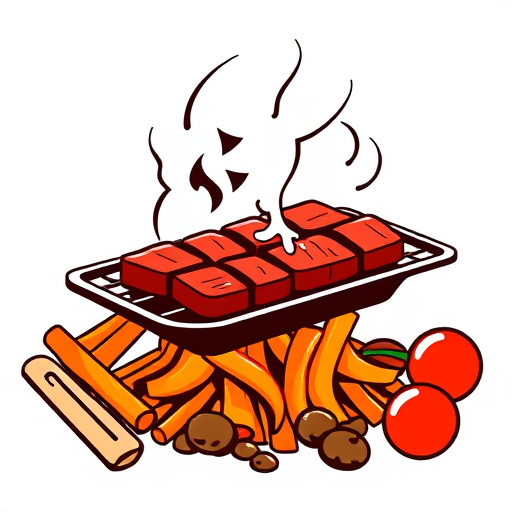Selecting the perfect cut of meat is essential for crafting mouth-watering BBQ beef ribs. Opt for high-quality, meaty ribs like baby back or spare ribs with good fat marbling. Trimming fat and silver skin enhances flavor and cooking performance. A classic BBQ sauce base combines tomatoes, brown sugar, paprika, garlic powder, and onion powder. Personalize with ketchup, vinegar, brown sugar, garlic, paprika, and liquid smoke for a balanced, homemade sauce.
Elevate your barbecue game with this ultimate guide to crafting the perfect BBQ sauce for mouthwatering beef ribs. From selecting the ideal cut of meat to mastering the low-and-slow cooking method, every step ensures tender, juicy ribs. Learn to balance classic sauce elements—sweetness, acidity, and smokiness—and explore dry rubs, marinades, and glazing techniques for enhanced flavor. Discover creative serving suggestions and pairings that will impress any BBQ enthusiast with this delicious BBQ beef rib recipe.
- Choosing the Right Ribs for Your BBQ Sauce
- – Selecting the perfect cut of beef ribs
- – Tips for trimming and preparing the ribs
- Creating a Classic BBQ Sauce Base
- – Essential ingredients for a basic sauce
- – Balancing sweetness, acidity, and smokiness
Choosing the Right Ribs for Your BBQ Sauce

When it comes to crafting the perfect BBQ sauce for beef ribs, selecting the right cut of meat is half the battle won. Opting for high-quality, meaty beef ribs is essential. Look for ribs with a good amount of meat between the bone and the skin, ensuring they are marbled with fat—this adds flavor and keeps the ribs juicy during cooking. The most popular choice for a BBQ beef rib recipe is often the baby back ribs or spare ribs due to their tender texture and abundant meaty surface area, perfect for soaking up your sauce.
Remember, the right ribs will ensure your homemade BBQ sauce clings to every nook and cranny, resulting in an incredibly flavorful and tender dining experience. So, choose your ribs wisely, and let the cooking begin!
– Selecting the perfect cut of beef ribs
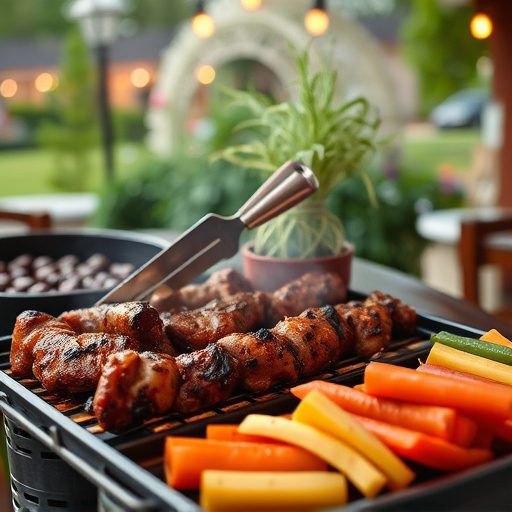
When it comes to crafting the perfect BBQ beef rib, choosing the right cut is half the battle won. Look for ribs that are meaty and have a good marbling of fat. This ensures your ribs will be tender and juicy when cooked slowly over low heat, allowing the flavors from your homemade BBQ sauce to penetrate deeply. The most common cuts include baby back and spareribs; both offer excellent flavor potential for your BBQ beef rib recipe.
Baby back ribs are known for their smaller size and less bone structure, making them easier to manage but offering a slightly different flavor profile compared to spareribs. Spareribs, on the other hand, have more meat and a richer taste due to their higher fat content. Regardless of your choice, selecting high-quality, well-marbled ribs is key to achieving mouthwatering results that will satisfy any BBQ lover.
– Tips for trimming and preparing the ribs
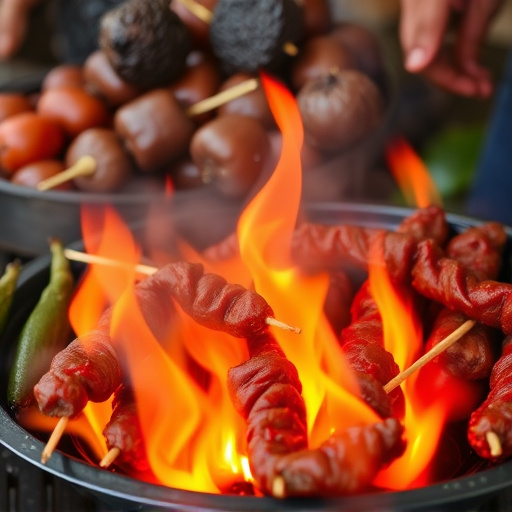
When preparing beef ribs for a mouthwatering BBQ sauce, the first step is trimming and ensuring they’re in optimal condition. Start by removing any excessive fat or silver skin from the rib surface; this not only improves the overall look but also promotes even cooking. Cut between the bones to separate each rib section, creating individual pieces that are easier to manage and marinate.
For best results in your BBQ beef rib recipe, consider scoring the meat on the bone side—a technique called “pinking” or “tending.” This helps the sauce penetrate deeper into the ribs, enhancing flavor penetration during cooking. Remember, proper preparation is key to unlocking the full potential of your homemade BBQ sauce and ensuring a tantalizing culinary experience.
Creating a Classic BBQ Sauce Base
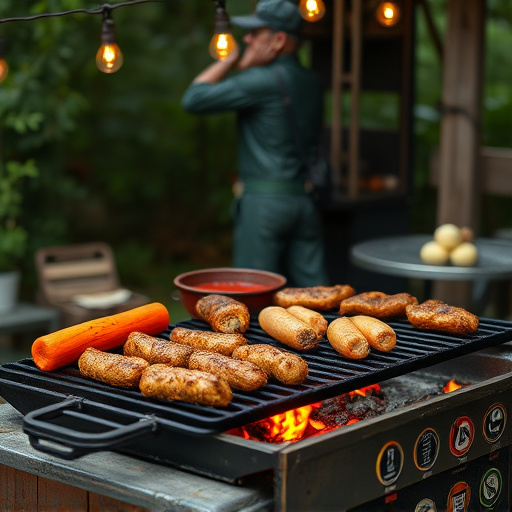
Creating a classic BBQ sauce base is the foundation for any mouthwatering BBQ beef rib recipe. Start by combining a rich, tangy tomato base with a blend of sweet and savory spices like brown sugar, paprika, garlic powder, and onion powder. These essential ingredients form the heart of the sauce, imparting depth of flavor that complements the tender, juicy beef ribs perfectly.
For an authentic BBQ experience, simmer this base mixture until it thickens slightly, allowing flavors to meld and enhance each other. You can adjust sweetness levels by tweaking the brown sugar content or add a kick with chili powder for those who enjoy a spicy twist in their BBQ sauce. This versatile base serves as a canvas upon which you can paint your ribs with a coat of delicious, homemade BBQ sauce.
– Essential ingredients for a basic sauce
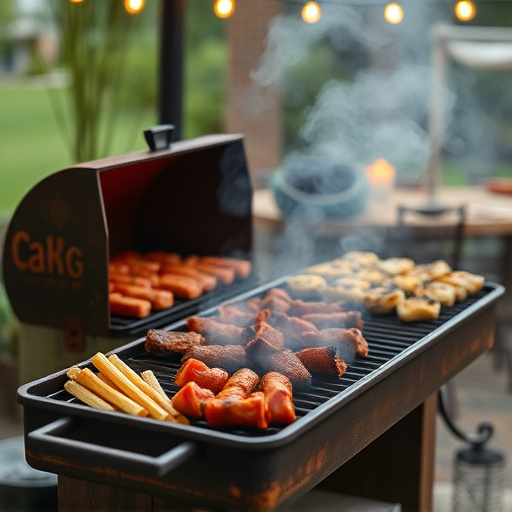
When crafting a mouthwatering BBQ beef rib sauce, several essential ingredients form the foundation for a delicious homemade recipe. The classic trio includes ketchup, vinegar, and brown sugar—a combination that balances sweet, tangy, and savory flavors. These fundamental elements create a robust base, enhancing the ribs’ natural juices and creating an irresistible glaze.
For a truly exceptional BBQ beef rib recipe, consider adding garlic and paprika to the mix. Garlic adds a pungent aroma and a subtle heat, while paprika contributes a smoky, slightly spicy dimension. These additional spices not only elevate the sauce’s taste but also enhance the overall dining experience, making your homemade ribs the star of any barbecue gathering.
– Balancing sweetness, acidity, and smokiness
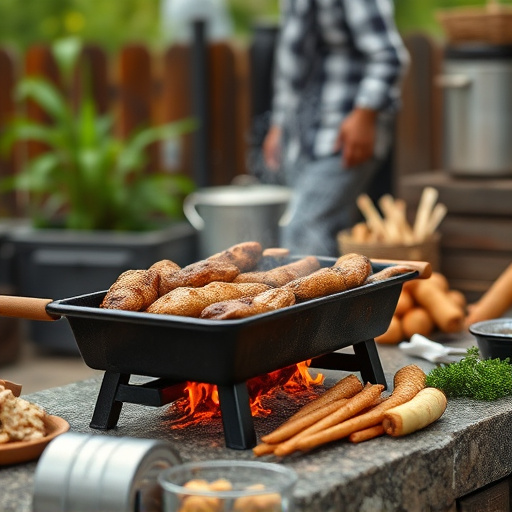
Creating the perfect BBQ sauce for beef ribs involves a delicate balance between three key elements: sweetness, acidity, and smokiness. In a BBQ beef rib recipe, these flavors intertwine to elevate the dining experience. Start with a base of ketchup or tomato paste for sweetness, then add vinegar or lemon juice for a tangy kick that cuts through the richness. Smoked paprika, chipotle peppers, or liquid smoke impart a subtle smokiness, enhancing the ribs’ natural flavor without overpowering them. Adjusting these components to your preferred ratio ensures a sauce that’s neither too cloyingly sweet nor too sour—just right for soaking into tender beef rib meat.
The art lies in gradually adding and tasting as you go. Too much sweetness can mask other flavors, while excessive acidity can make the ribs taste sour rather than savory. Striking the right balance will result in a sauce that complements the ribs’ tenderness without overpowering it. This meticulous approach ensures your homemade BBQ sauce not only tastes fantastic but also showcases your culinary skills for any barbecue gathering.
